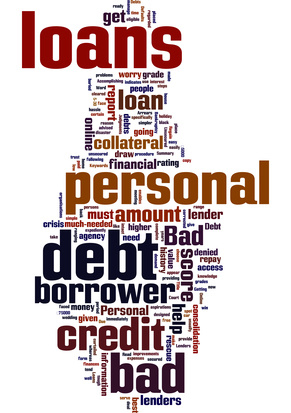There are some advantages to consolidating your debts into one consolidation loan. Even the word ‘consolidation’ is reassuring for many people. It invokes the idea of reducing a lot of little and some not so little problems into one single manageable problem.
Instead of having a large number of creditors to deal with, the debtor will have just one creditor to manage and just one monthly payment to make instead of having to make multiple payments to a variety of creditors for varying amounts. As a result the debtor expects that managing finances will become simplified. The other big expectation is that the debtor’s credit rating will improve dramatically once all unsecured debts and in particular credit card debts are lumped into the consolidation. Each and every one of the old credit card accounts gets paid off once and for all. To crown it all, the monthly repayment on the consolidation loan will hopefully be significantly lower than the total sum of the repayments on all of the old debts – credit cards, overdrafts and personal loans.

Well, that is the theory anyhow. The first thing to understand is the reason why monthly payments go down at all. It is not really the benevolence or generosity of the new consolidation loan provider which prompts this reduction. There are often several factors at play. One factor is that the term of the consolidation loan may be (much) longer than the terms of the original loans. For example, had the debtor continued financing each of the old loans (instead of lumping them all into a consolidation loan), then he or she might well have paid some of them off rather quickly and others over a longer period of time. A second factor is that the lender of the consolidation loan may seek to secure the advance on the debtor’s property, often the family home. If this is the case, the lender has significantly reduced the lending risk that the debtor will default on payments since the lender may ultimately rely on the equity in the property to satisfy the debt if necessary. Lower monthly repayments are usually based on one or both of these factors. While the interest rate on the proposed consolidation loan may be lower that the rate the debtor is currently paying on some accounts at present, the total amount repayable over the full term of the consolidation loan could be considerably greater that the total now payable under the old loans.
Let’s see what can go wrong if you take out a consolidation loan. If you are struggling to make your repayments at present you need to ensure that you can comfortably make the consolidation loan payments in a sustainable way and for the full duration of the projected term. You need to stop using the credit lines that you have been using. For example, you need to cut up your credit cards since the lenders may, now that you have cleared the balances, tempt you to continue to use the same credit cards that got you into trouble in the first instance. You will also have to stop using any overdraft facilities which contributed to your financial difficulties in the first place. Since most of your disposable income will have to go to repay the consolidation loan you will have to limit your access to other credit even if your ‘old’ creditors may want to do further business with you and make all kinds of ‘attractive’ credit offers to you. It is best to resist such offers, if you want to avoid struggling financially again.
Another disadvantage is that if you have agreed to secure the consolidation loan on your property and find that you are unable to keep up the repayments, you may lose your property. While you may achieve a low interest rate on the consolidation loan by agreeing to secure it on your property, the likely longer term of the consolidation loan means that you give up some flexibility relating to your mortgage e.g. you will not be mortgage-free as soon as you expected to be and you may not be able to retire as early as you had planned to do.
So, do think long and hard before you plump for debt consolidation. Consider other options which may be more appropriate to your circumstances. For example you need to check whether you may be insolvent. If you are insolvent, two of the options you might want to consider are either to enter into an Individual Voluntary Arrangement (IVA) or to petition for your own Bankruptcy (BCY). These are two personal insolvency processes that protect you from your creditors and that have the full weight of the law behind them. Even if you are not insolvent, you might want to consider entering into a Debt Management Plan (DMP) with your creditors. You can do this yourself by reaching agreement with each of your creditors individually as to how you will repay your debts to them. This is sometimes called a self administered DMP. Most DMPs however are administered with the assistance of companies which specialise in setting up DMPs between consumers and their creditors and which then administer these plans over a period of years. Whatever you decide, do take advice. Avoid consolidation until you are aware of and have considered all other options.